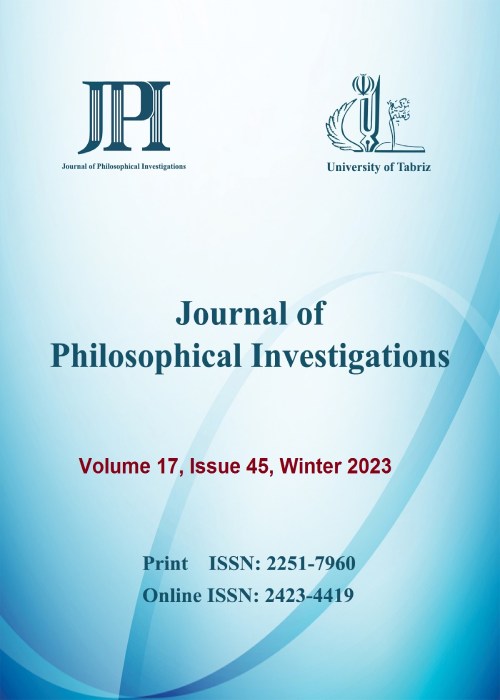Review and criticize two Obstacles of God's Altruism in Philosophy of Mulla Sadra
Author(s):
Article Type:
Research/Original Article (دارای رتبه معتبر)
Abstract:
1. Introduction
The main question in this article is how egoism evidence can consistent with the theory of divine grace and God's original Favor to the “other”? In addition, the hypothesis is that: Egoism in the human realm is contradicted by Altruism, but of God Egoism does not conflict with Altruism. The reason for this is the unity of God, as the absolute perfect does not have any defect. Sadra's philosophy is: The attention of God to the creatures requires perfectibility, and the perfectibility is a sign of defect. Therefore, if God wants to be Altruism, it must be incomplete, while God is Super perfection, so God is not Altruism. The second obstacle to God's Altruism in Mulla Sadra's philosophy is In Islamic philosophy in general and in
Sadra's philosophy in particular, it is said that: God loves himself, and his love for himself requires his love for the world. Because the whole world is his works and love is effective, it is the same love for the work. In other words: God's love for creatures, then his love for himself and his love for himself. Therefore, God has an extraordinary interest to others, and this can be contrasted with the transformation in which the noble intention is raised. Then all ends come to the subject, and referring all ends to the subject can be a kind of Egoism in which the acts of any being, including God, are always affected by one motive, and that motive is nothing but the Self-love and God is no exception to this rule. Therefore, God is not Altruism. In this study, based on the internal possibilities of Mulla Sadra's philosophy, we are in this study, based on the internal possibilities of Mulla Sadra's philosophy; we are Analyzed two of these obstacles and criticize.
2. Material and Method
In this paper, the library method is used, and it is the method of content analysis, and the opposite evidence of the problem (= God's Altruism) will be presented, explained and analyzed, and argued for the benefit of the problem. The structure of this paper will thus be that in the first part, the literature of the research will be titled and the opposite evidence of the problem will be clarified, then the opposite evidence will be criticized, finally, the Conclusion will be made.
3.Conclusion
1. The center of psychological and moral egoism is in the human domain, but it is possible to search for the components of egoism in a metaphysical domain, which does not mean a Category Mistake and does not apply a blind metaphor to the facts.
2. In Mulla Sadra's philosophy, there are two main obstacles in the issue of God's Altruism, namely: “Excellent no attention to below” and “reference for all purposes to the subject”. In the present study, these two obstacles have been criticized, and it has been shown that God is not egoism, but he is an Altruism, and since God is the ultimate being and the ultimate perfection, he is the most complete Altruism. In addition, because he is rich, he is absolute to provide the best of good for others without any reason.
3. An excellent being, such as God, which is by defining the most complete being, consists of all perfections, including justice, based on the principle of justice, does not injustice anyone, and It does not need the interests and perfection. And don’t conflict between its interests and the “other” interests. Therefore, there is no conflict with God's Altruism.
4. In Mulla Sadra's philosophy, according to the principle of “simple reality is everything” and the existential analysis of the principle of causation, one can show that “reference for all purposes to the subject” is not in conflict with the original attention of God.
References
Aristotle (2004) Nicomachean Ethics, translated and edited by Roger crisp, Cambridge university press.
Ayn Rand (1964) the Virtue of Selfishness, A New Concept of Egoism, New York, the Objectivist Newsletter.
Campbell (2001) ‘Egoism’ in Encyclopedia of ETHICS, Volume I –G, Second Edition, Lawrence C. Becker and Charlotte B. Becker Editors, Rutledge New York, and London.
Dienstbier, Richard A and others (2001) Evolutionary Psychology and Motivation (Nebraska Symposium on Motivation, Vol. 47).
Holmes, Robert L. (2007) The Basics of Ethics Philosophy, Translated by Masoud Oliya, Tehran, Phoenix. [In Persian]
Francana, William K. (2014) Moral Philosophy, Hadi Sadeghi Translation, Qom, Tae. [In Persian
Kratt, Richard (2004), "Self-esteem and Transformation in Moral Philosophy", Nassiri, Mansour, Marefat, Khordad, No. 78, pp. 53-55. [In Persian]
Maslow, Abraham (1970) Motivation and Personality, Harper and Row.
Sadr-Aladdin Shirazi, Muhammad, (1989). Four Journeys. Qom: Maktabat-Mostafavi. [In Arabic]
Sadr-Aladdin Shirazi, Muhammad, (1981 A).Al-Asrar-Al-Ayat. Tehran: Iranian Institute of Theosophy and Philosophy. [In Arabic]
Sadr-Aladdin Shirazi, Muhammad, (1981 B). Al-Shavahed Al-Rububiyah. Thran: University Publishing Centre. [In Arabic]
Sadr-Aladdin Shirazi, Muhammad, (1984). Mafatih Al-Gheib. Tehran: Ministry of Culture and Higher Education. [In Arabic]
Keywords:
God , Altruism , Purpose , Ethical egoism , Intention , Mulla Sadra
Language:
Persian
Published:
Philosophical Investigations, Volume:12 Issue: 25, 2019
Pages:
137 to 156
magiran.com/p1935326
دانلود و مطالعه متن این مقاله با یکی از روشهای زیر امکان پذیر است:
اشتراک شخصی
با عضویت و پرداخت آنلاین حق اشتراک یکساله به مبلغ 1,390,000ريال میتوانید 70 عنوان مطلب دانلود کنید!
اشتراک سازمانی
به کتابخانه دانشگاه یا محل کار خود پیشنهاد کنید تا اشتراک سازمانی این پایگاه را برای دسترسی نامحدود همه کاربران به متن مطالب تهیه نمایند!
توجه!
- حق عضویت دریافتی صرف حمایت از نشریات عضو و نگهداری، تکمیل و توسعه مگیران میشود.
- پرداخت حق اشتراک و دانلود مقالات اجازه بازنشر آن در سایر رسانههای چاپی و دیجیتال را به کاربر نمیدهد.
In order to view content subscription is required
Personal subscription
Subscribe magiran.com for 70 € euros via PayPal and download 70 articles during a year.
Organization subscription
Please contact us to subscribe your university or library for unlimited access!


